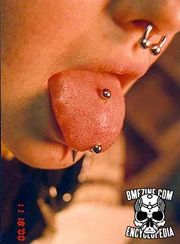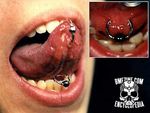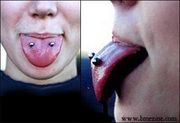Tongue Surface Piercing: Difference between revisions
Jump to navigation
Jump to search
(Created page with "<html><div class="mw-content-ltr" dir="ltr" id="mw-content-text" lang="en"><div class="thumb tright"><div class="thumbinner" style="width:182px;"><a class="image" href="/index.php?title=File:Tongue_Surface_Piercing-1.jpg"><img alt="" class="thumbimage" height="244" src="/images/thumb/b/b0/Tongue_Surface_Piercing-1.jpg/180px-Tongue_Surface_Piercing-1.jpg" width="180"/></a> <div class="thumbcaption"><div class="magnify"><a class="internal" href="/index.php?title=File:Tongu...") |
(No difference)
|
Revision as of 01:33, 21 May 2023
The tongue does not need to be entirely transversed in order to pierce it; tongue surface piercings are possible (although they are prone to rejection and migration). Care should be taken to ensure that the jewelry placement does not interfere with the movement of the tongue during speech like a horizontal tongue piercing may.
Both perpendicular placements and lengthwise placements are possible, as are piercings through the top surface, the tip, or even the bottom (sometimes known as a Lingum Piercing).
Alternate Names
- Lingum Piercing - a Local Term (coined by Jon Cobb around 1993) for a surface piercing across the lower surface of the tongue. This placement can be less prone to rejection than other tongue surface piercings.
- Scoop Piercing - a specific name for a horizontal tongue surface piercing. It is a local term provided by Jeremy Elms of Solid Image Tattoo in Boynton Beach, FL.



